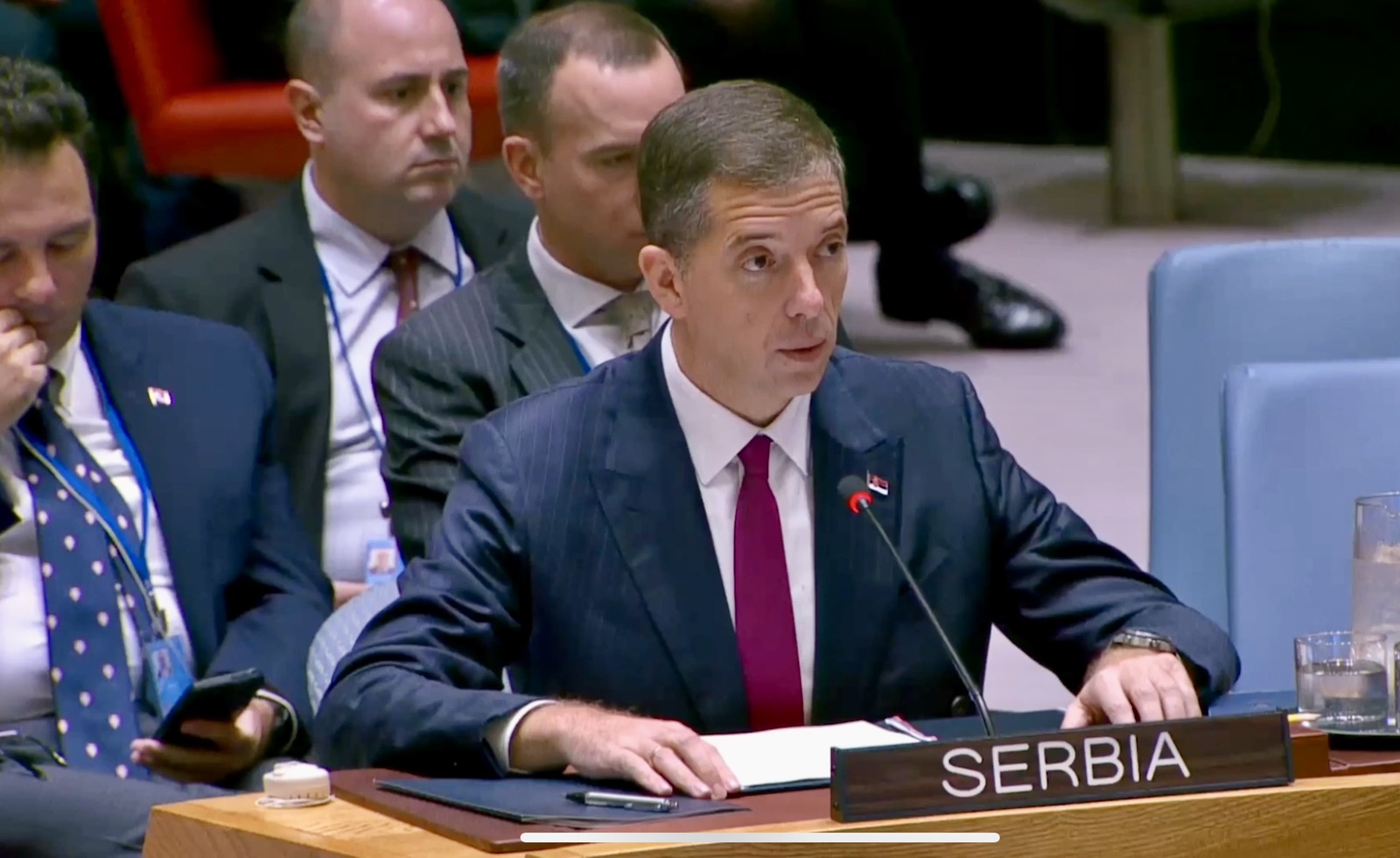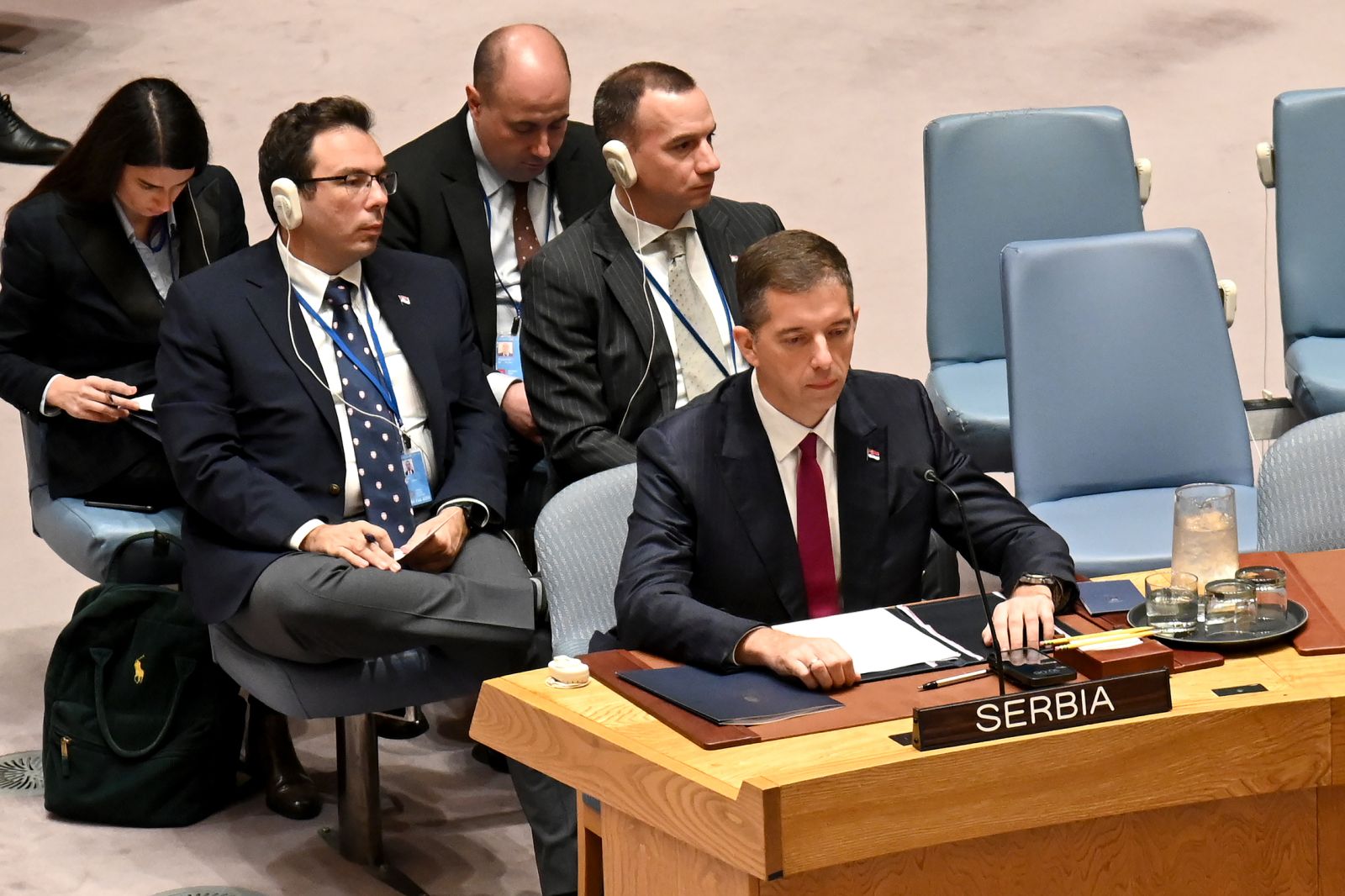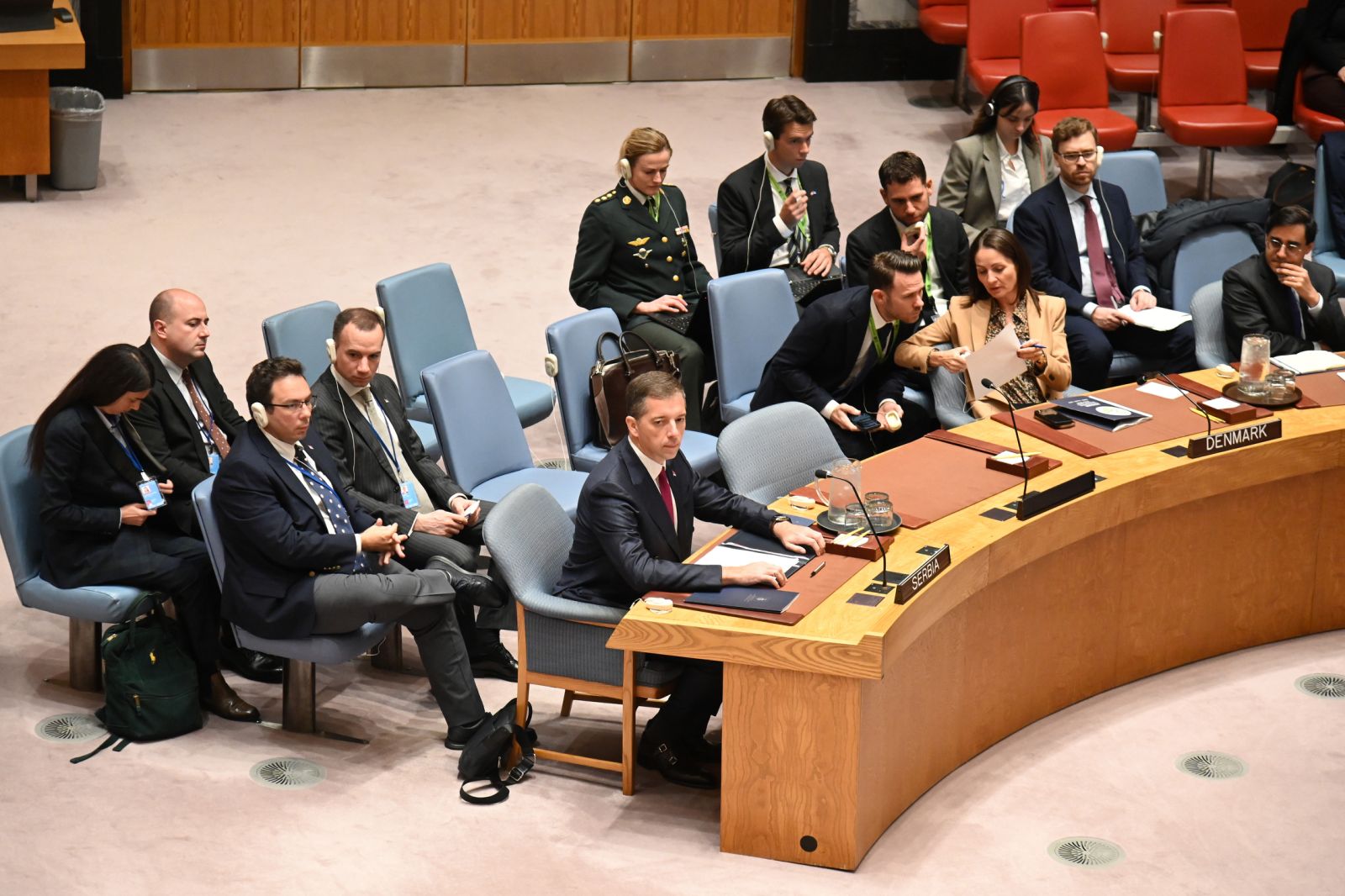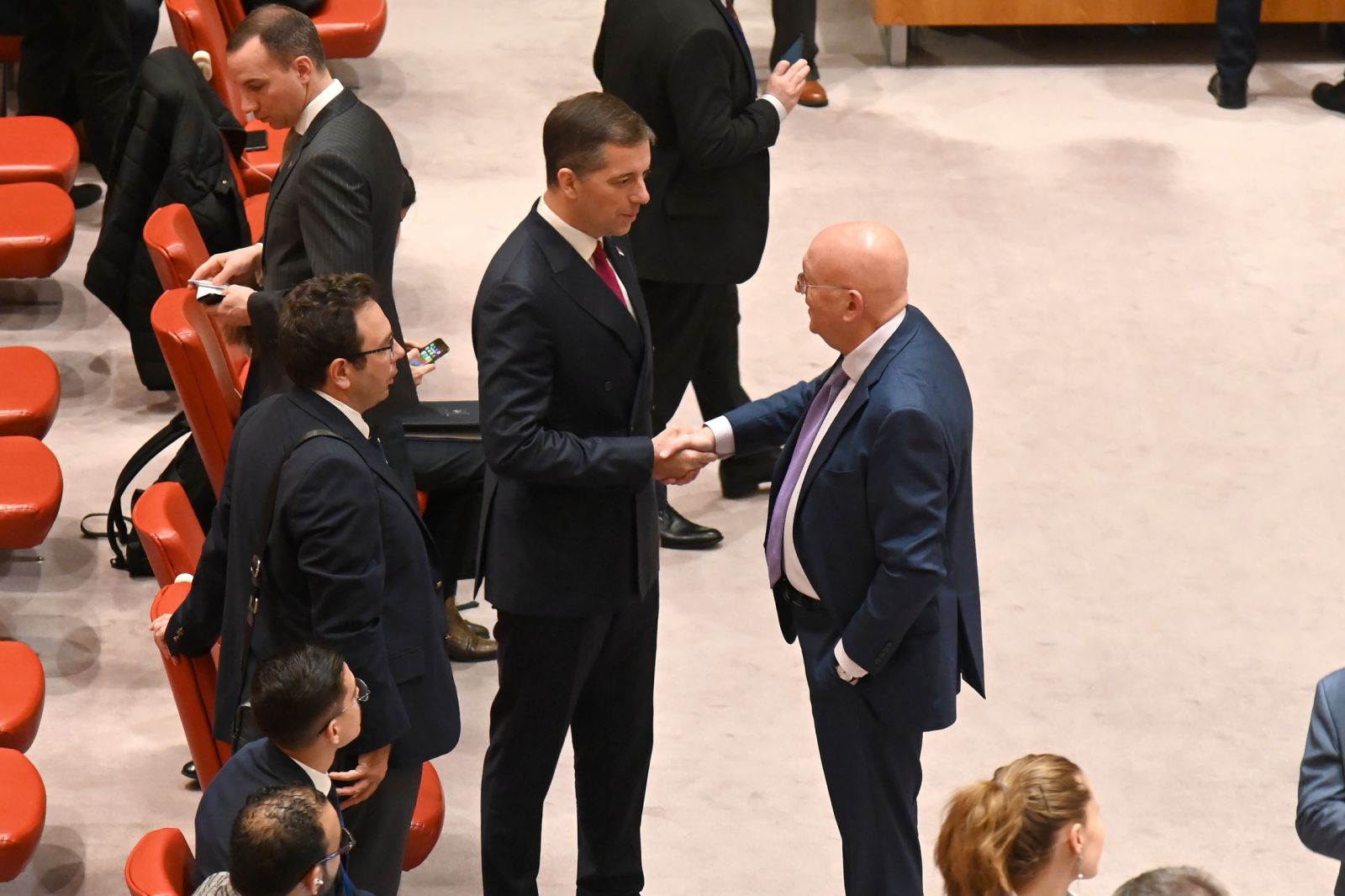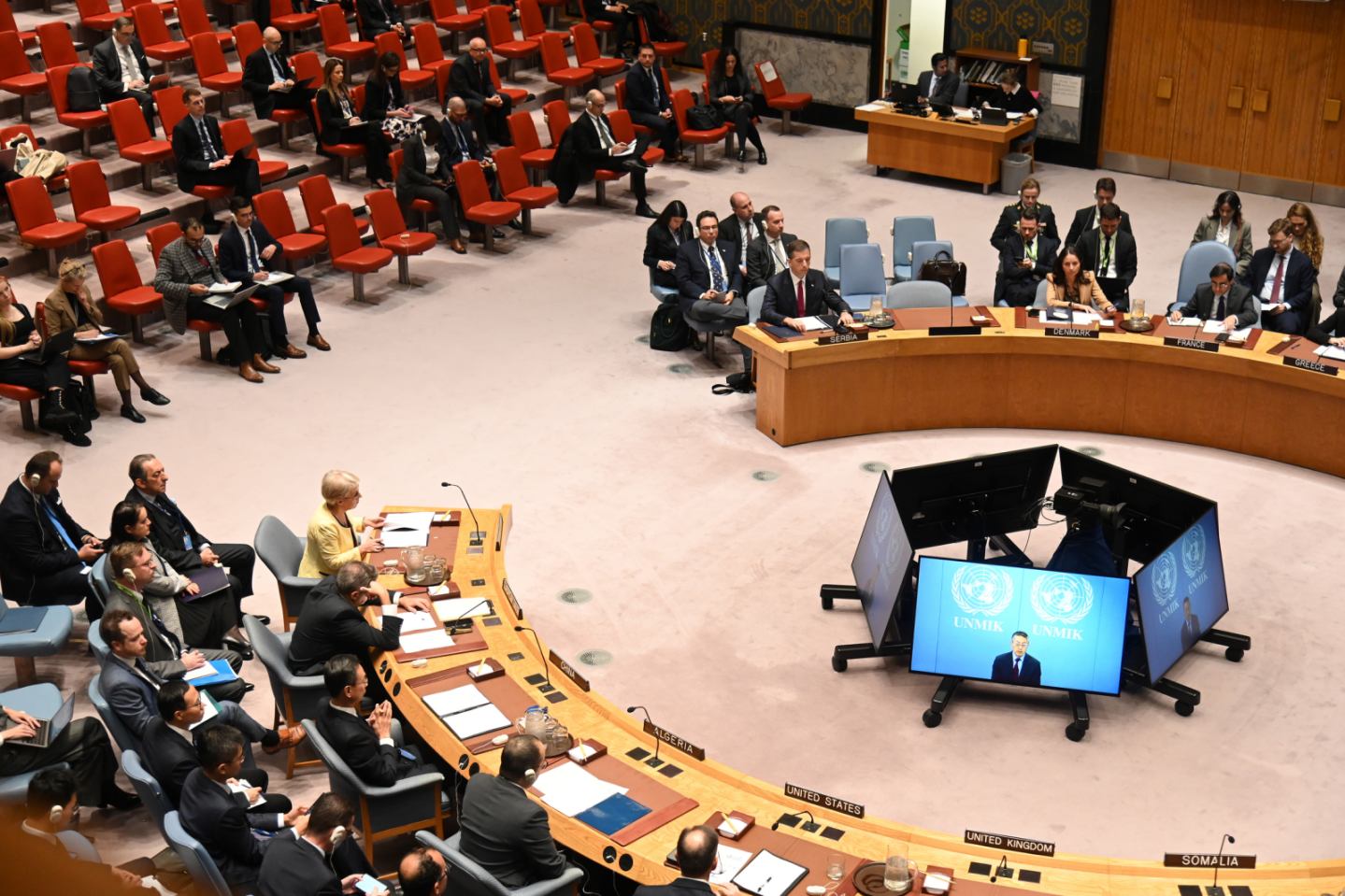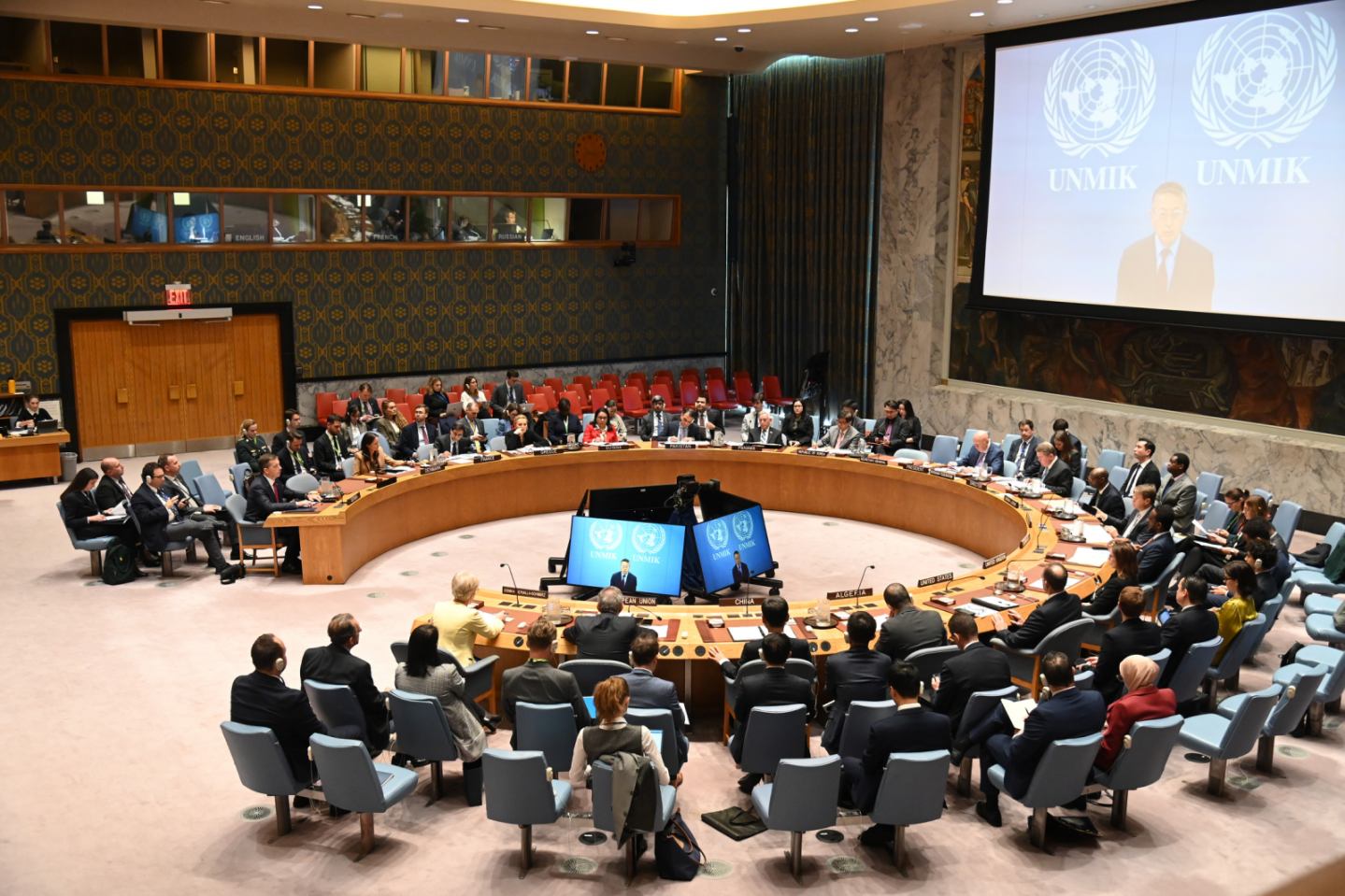Address by Minister Đurić at the UN Security Council Session in New York
We convey Minister Đurić’s statement in full:
Allow me to begin my address with the words of Nelson Mandela, who once said:
“To deny people their human rights is to challenge their very humanity.”
These words resonate with painful clarity today as we speak about Kosovo and Metohija, where the fundamental rights of Serbs are not merely neglected – they are being systematically violated, piece by piece. What we are witnessing is not an abstract political dispute, but a struggle of human beings for dignity, safety, and survival.
At the outset, I wish to express my sincere gratitude to UN Secretary-General António Guterres and Deputy Special Representative of the Secretary-General Mr. Dongjoon Shin for the report before us today and for their unwavering commitment to the implementation of UNMIK’s mandate in accordance with UN Security Council Resolution 1244.
The Republic of Serbia also extends its deep appreciation to all members of UNMIK who, despite difficult circumstances, limited resources, and often hostile surroundings, work tirelessly to preserve peace, security, and the protection of human rights in Kosovo and Metohija. We particularly value the dedicated work of the former Head of Mission, Ms. Caroline Ziadeh.
This year, as we mark the 80th anniversary of the founding of the United Nations – that beacon of hope born from the ashes of the darkest war in human history – we are reminded of its fundamental pledge: “Never again.” Yet, on the sovereign territory of a UN member state, that pledge is being put to the test.
In Kosovo and Metohija, we are witnessing ethnically motivated attacks, systematic persecution, arbitrary arrests, open usurpation of property, and unchecked violence – all of which directly challenge the principles upon which this Organization was founded.
In this context, Serbia welcomes the Secretary-General’s report as a modest yet important step toward more balanced and realistic reporting on the situation in Kosovo and Metohija. We deeply value UNMIK’s role in upholding international law, protecting vulnerable communities, and maintaining stability under growing pressure.
However, we must speak frankly: the report does not fully reflect the magnitude of the tragedy unfolding daily. This is not an abstract crisis – it is the destruction of human lives, the shattering of families who live in fear, and the theft of childhoods in the 21st century through violence and injustice.
Prime Minister Kurti’s regime has closed 128 key institutions in Serb-majority areas – including facilities of education, healthcare, social protection, postal services, pension and employment systems. Even the Red Cross in Kosovo and Metohija has been targeted, which constitutes a blatant violation of the core principles of the International Red Cross and Red Crescent Movement.
The Secretary-General’s report itself records that:
“Kosovo authorities continued closing institutions operating within the system of the Republic of Serbia, including the branch of the Pension and Disability Insurance Fund and the National Employment Service in Leposavić, the city library and museum in North Mitrovica, the Red Cross branch in Zubin Potok, and the sports hall in Leposavić.”
The report also notes that:
“International actors criticized such actions as obstacles to access to basic services, affecting citizens’ social, economic, and cultural rights.”
Even more tragically, ethnically motivated attacks have become part of daily life, with Serbian children bearing the greatest burden. Since Albin Kurti came to power, 37 attacks on Serbian children and youth have been recorded. Just last week, the world witnessed the attempted abduction of a minor Serbian girl, whose only “crime” was her ethnic identity. Her courage and scream for help prevented a tragedy — and yet her attackers remain free, unpunished.
This sends a chilling message to every Serb: Your life is expendable. Your safety, dignity, and childhood mean nothing. If you are a Serb, no vulnerability — not youth, not age, not innocence — will protect you. You are marked simply for existing.
This systematic denial of rights is not only a tragedy for the Serbian people – it is a moral failure of the international community to act. I ask: what kind of future awaits children who must learn to hide their Serbian language from cradle to grave?
These horrors are not accidental – they are the result of a consciously cultivated policy of hatred, embodied in Kurti’s doctrine of slow ethnic cleansing. His goal is to drive Serbs from their homes, their sanctuaries, and the lands of their ancestors.
The situation is further aggravated by the alarming militarization of Kosovo and Metohija – the accelerated arming of the so-called Kosovo Security Forces, including the recent delivery of combat drones from a neighboring country. Such developments jeopardize the fragile balance of security in the region. Serbia has repeatedly warned that peace cannot be built on the principle of arming one side while ignoring the legitimate security concerns of the other.
This undermines the hard-won progress achieved during the first term of President Donald Trump, which inspired hope for regional stability and partnership.
Kurti is not waging war against political opponents – he is waging war against an entire people. Politically motivated arrests, institutional abuse for intimidation, and secret warrants against Serbian representatives all undermine the rule of law and further isolate and marginalize our community.
Equally disturbing are the increasing attacks on Serbian Orthodox Church sites – the cultural heritage of all humanity. The desecration of monasteries is not random vandalism but a deliberate attempt at erasure. The message is: “You do not belong here.” Kurti’s regime arrests bishops, interrogates priests, alters historical place names, and shuts down institutions that form the very core of community life.
The Secretary-General’s report also notes:
“Numerous incidents affecting Serbian Orthodox and Catholic sites in areas where Serbs are not the majority were recorded, including acts of vandalism, illegal construction, and harassment of clergy.”
Consider North Mitrovica: the cherished Cyrillic sign bearing a red heart was destroyed and replaced by an Albanian inscription in green tones. This is not bureaucracy — it is symbolic warfare: the suppression of language, the rejection of Christian symbols, and the erasure of Serbian traces. Add to this the renaming of Lake Trump — a name chosen by local Serbs to honor peace efforts — and Kurti’s intolerance stands fully exposed.
As President Donald Trump himself stated in this very Organization:
“If we desire lasting peace, we must learn to see the world through the eyes of others.”
This is precisely what Kurti refuses to do — and what Serbia continuously advocates: mutual respect, justice, and sustainable coexistence.
The report further records that:
“Local authorities repainted murals and graffiti in all four northern municipalities of Kosovo and Metohija containing Serbian symbols, including those related to the Serbian Orthodox Church,” and that “Kosovo institutions systematically violated the Law on the Use of Languages, placing traffic signs exclusively in Albanian.”
In this climate of fear, over 20% of the remaining Serbs have left Kosovo and Metohija in recent years – a silent exodus that exposes our collective failure to ensure basic security. Only 17 returns were recorded during the reporting period, while over 230,000 people have been displaced since 1999.
Can we truly call this a multiethnic society? Can coexistence exist where return is impossible? Can we speak of democracy and the rule of law when people flee for their lives?
How can “progress” be proclaimed a victory, when survival demands silence?
Ladies and Gentlemen,
And yet, the spirit of the Serbian people in Kosovo and Metohija remains unbroken and endures. That resilience was demonstrated in the local elections of 12 October, where the Serb List achieved a resounding victory in nine out of ten Serb-majority municipalities in the first round. This is not merely a political result – it is a message of resistance, faith in Serbia, democracy, and the right of a people to decide its own destiny. An increasing number of Albanians are likewise rejecting extremism and choosing peace over division.
I extend my gratitude and admiration to all Serbs in Kosovo and Metohija, with this message: your perseverance is an inspiration to us all – Serbia stands with you, firmly, resolutely, and responsibly.
These victories could easily have been annulled – Prime Minister Kurti attempted to ban the Serb List and deprive Serbs of their basic voting rights. His regime has openly violated the so-called Constitution, imposing political loyalists and nullifying the will of the electorate.
This is not merely Serbia’s assessment – it is confirmed by the UN Secretary-General’s report, which notes that the Central Election Commission refused to certify the Serb List and the Serbian Democracy Party, and that the Quint, the EU Office in Pristina, and UNMIK criticized such a decision, warning that such actions undermine democratic principles and erode trust in Kosovo’s institutions.
Serbia remains committed to the EU-facilitated dialogue. Under the leadership of President Aleksandar Vučić, who works tirelessly for regional stability and development, Serbia seeks compromise, not conflict; protection of its people, not dominance. But dialogue requires goodwill from both sides – Serbia extends its hand; Pristina must respond in kind.
Today we send a clear message: after twelve years, Pristina must establish the Community of Serb-Majority Municipalities. This is not Serbia’s demand – it is Pristina’s obligation, undertaken before the European Union and its own citizens, a cornerstone for the rights and security of the Serb community.
Prime Minister Kurti is systematically sabotaging dialogue, undermining the Brussels and Washington Agreements, halting joint projects, refusing to recognize diplomas, endangering religious freedoms, and dismantling the hard-won peace. He is eroding President Trump’s peace legacy, once again rekindling tensions in the Balkans.
This reckless conduct is further aggravated by the ongoing militarization of the so-called Kosovo, which risks further escalation. The delivery of lethal drone systems and other offensive capabilities to the so-called Kosovo Security Forces deepens mistrust, undermines regional confidence, and contradicts the spirit of restraint long advocated by this Council.
Despite all this, Serbia stands for stability – for partnership instead of provocation, for dialogue instead of discord. We seek nothing unjust; we simply and firmly defend our rights and our people. Peace must rest on justice, and every attempt at revisionism will be met with our unyielding truth.
Distinguished Members of the Council,
The role of UNMIK remains irreplaceable, and its mandate must not be questioned. Its presence in Kosovo and Metohija is a guarantee of peace and protection of human rights. Serbia firmly demands the full and undiminished presence of the United Nations Mission.
We also insist that Security Council sessions on UNMIK’s work remain open to the public, for transparency is the only way for truth to prevail over manipulation.
Ladies and Gentlemen,
Serbia is not an obstacle; we are part of the solution – a stable, lawful partner. Peace cannot be one-sided: it collapses when victims are silenced, when children are terrorized, and when peoples are erased.
The Secretary-General’s report underscores that “the concerns of non-majority communities, particularly Kosovo Serbs in the north, regarding the closure of institutions providing basic services, must be addressed,” and that “the protection of the economic and social rights of minority communities is of vital importance.”
It further calls on the Kosovo authorities to protect and promote human rights... with full respect for due process and international human rights standards, including the rights of children as guaranteed by the Convention on the Rights of the Child.”
I believe that Serb-Albanian friendship is possible in the future, just as it appears possible through the recent bilateral steps between Serbia and Albania – once freed from Kurti’s apartheid-like nationalism. Once a prisoner himself, Kurti now mirrors his captors, intoxicated by power and ethnic supremacy.
Let this session renew the United Nations’ eighty-year mission: to defend justice, peace, and human dignity. Ignoring the violation of Serbs’ rights undermines the world order.
Serbia believes in dialogue, values peace, and seeks compromise. But silence in the face of injustice is complicity.
Therefore, Serbia calls on this Council and the world: fully support UNMIK, condemn violations of Serbs’ rights, and defend international law as the cornerstone of security.
We extend our hand in dialogue – but we will resolutely protect our people, our dignity, and our sovereignty.
Thank you.

